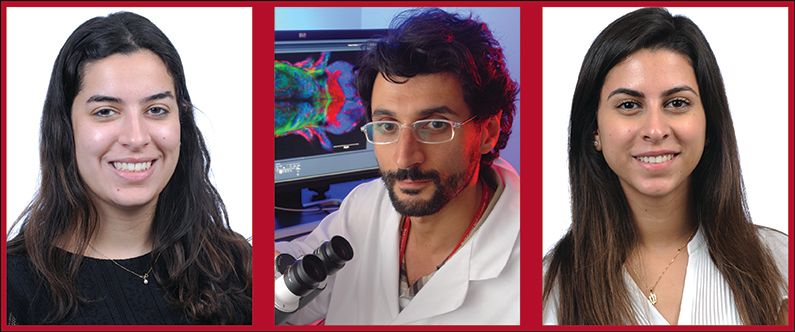WCM-Q student researchers probe effects of COVID-19 on pregnancy
 WCM-Q medical students Reem Chamseddine (left) and Farah Wahbeh published a research paper on the effects of COVID-19 on pregnancy, aided by their mentor Dr. Arash Rafii Tabrizi.
WCM-Q medical students Reem Chamseddine (left) and Farah Wahbeh published a research paper on the effects of COVID-19 on pregnancy, aided by their mentor Dr. Arash Rafii Tabrizi.
Two medical students at Weill Cornell Medicine-Qatar (WCM-Q) have conducted a systematic review of the latest medical literature to provide a clearer understanding of how the novel coronavirus affects pregnant women, new mothers and newborn babies.
Second-year students Reem Chamseddine and Farah Wahbeh reviewed 245 pregnancies that were complicated by maternal SARS-CoV-2 infection across 48 scientific studies published between the emergence of the pandemic in December 2019 and July 30, 2020. They found that 55.9 percent of the pregnant women with SARS-CoV-2 infection presented with fever and 36.3 percent with a cough. A total of 12.7 percent presented with shortness of breath, but only 4.1 percent developed respiratory distress.
The vast majority (89 percent) of the pregnant women with SARS-CoV-2 delivered their babies via cesarean section, compared with 15 percent in the general population, the study noted. Out of 201 newborns reported in the literature, 35.3 percent of babies born to mothers with SARS-CoV-2 were delivered pre-term (before 36 weeks), compared with 13 percent in the general population. There was a concerning 2.5 percent rate of stillbirth delivery or neonatal death, compared with less than one percent in the general population. However, the study indicated that the risk of death for pregnant women with SARS-CoV-2 is low, and that it does not appear that the infection is vertically transmitted from mother to fetus during pregnancy, although 6.45 percent of newborns tested positive for the disease. It is possible these newborns acquired SARS-CoV-2 infection in the hospital or at home after birth, according to the literature.
The study also found that SARS-CoV-2 does not appear to be passed from mother to baby in breast milk, but that there is still a risk the infection can be passed on via respiratory droplets during breastfeeding. As such, SARS-CoV-2-positive mothers are advised to take reasonable precautions during breastfeeding.
The study, titled Pregnancy and Neonatal Outcomes in SARS-CoV-2 Infection: A Systematic Review, has been published in the Journal of Pregnancy, a leading peer-reviewed open-access journal.
Student Reem Chamseddine, a member of WCM-Q’s Class of 2023, said: “In the early days of the pandemic, not much was known regarding pregnancy complications in the setting of SARS-CoV-2 infection. Naturally, it was important to understand the emerging data about this topic as the virus would affect thousands of pregnant women. As medical students, we are encouraged to be curious and to engage in the healthcare issues around us. Getting to work on this project is an example of the academic values instilled in us here at WCM-Q.”
Farah Wahbeh, also a member of the Class of 2023, said: “The role of a medical student does not stop at learning how to diagnose and treat medical conditions; it is also our responsibility to take action during such uncertain times and to contribute in every way we can. This experience has been unique given the urgency and time sensitivity associated with the project. It taught us valuable skills and embodied our role as active contributors to the scientific community.”
Reem and Farah were mentored during the research process by Dr. Arash Rafii Tabrizi, Professor of Genetic Medicine in Obstetrics and Gynecology at WCM-Q, who is also a named author of the research paper.
Dr. Tabrizi, who is also Director of the Clinical Research Support Core at WCM-Q, said: “I was really impressed by the desire of our students to be part of the fight against COVID-19. In the early stages of the emergence of a new virus and a new disease there is a tremendous fear of the unknown and therefore an urgent need for evidence-based information. As such, the work of Reem and Farah perfectly illustrates one of the most important elements of our mission as doctors: we have to provide accurate information to allow people to adopt the correct attitude and actions to protect themselves and others.
He added: “The work was difficult as new information was coming in almost every day and Reem and Farah had to filter and organize it correctly. The final result is a great review that really illustrates the impact of COVID-19 on the pregnant women as well as their newborn babies.”
The review can be read in full here.